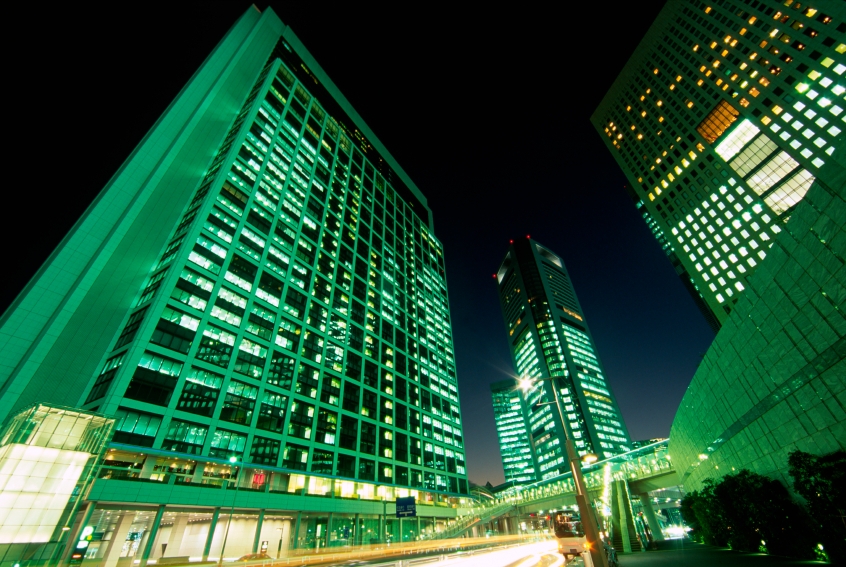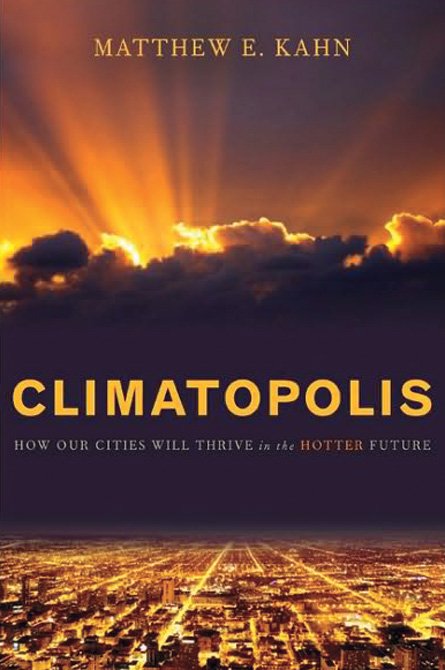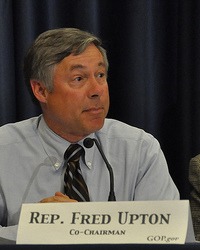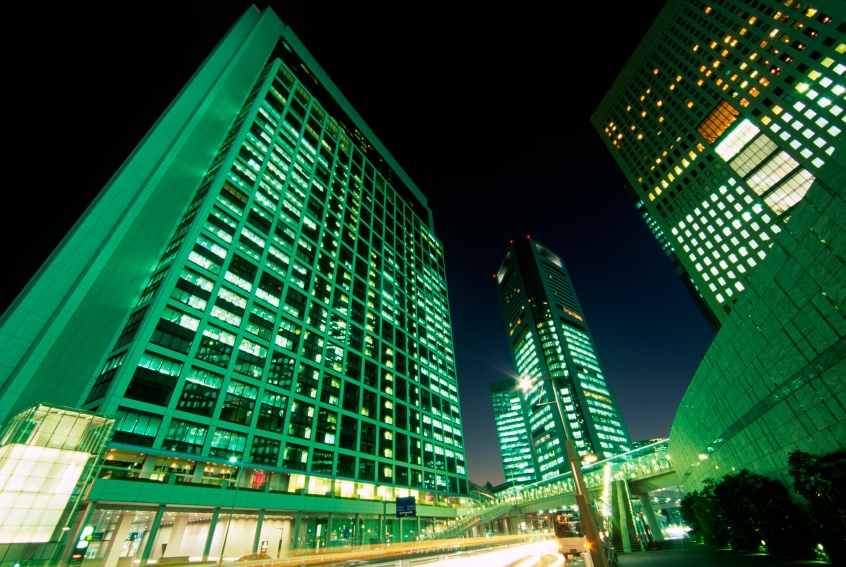 Climatopolis provides a micro-economist’s vision of how our cities will continue to thrive despite the costly challenge of climate change.Joe Romm is not a subtle writer. Even though his review of Climatopolis was not as favorable as those in The Economist, The Financial Times, or Nature [$ubreq], I’m thrilled that he “reviewed” my book. I thank Joe for his constructive suggestions. He highlights several points where the footnotes can be improved. In my next edition, I will address all of his points. But in no way do his points affect the book’s core logic.
Climatopolis provides a micro-economist’s vision of how our cities will continue to thrive despite the costly challenge of climate change.Joe Romm is not a subtle writer. Even though his review of Climatopolis was not as favorable as those in The Economist, The Financial Times, or Nature [$ubreq], I’m thrilled that he “reviewed” my book. I thank Joe for his constructive suggestions. He highlights several points where the footnotes can be improved. In my next edition, I will address all of his points. But in no way do his points affect the book’s core logic.
I’m disappointed that Romm didn’t bother to restate my book’s core thesis. In his review, he doesn’t mention the words “incentives,” “choice,” “innovation,” “capitalism,” “markets,” or “expectations.” But in a nutshell, these are the guts of my economic approach for thinking about climate-change adaptation.
To highlight this economic approach, consider the summer 2010 heat wave in Moscow. Thousands died as this extremely rare event unfolded. In Climatopolis (written months before the event), I said that Moscow faces less heat wave risk than Phoenix. So what have we learned? For one thing, Matthew E. Kahn is not Nostradamus. But the people of Moscow have learned a more important lesson. A silver lining of such a heat wave is that they will be woken up about the new realities of heat waves. Households will now take proactive steps such as buying air-conditioners, watching weather reports, and seeking to live in housing that is built to protect them from summer heat as well as winter cold. The government will do a better job of announcing heat waves to help the population protect itself and will open up “cooling facilities” in summer in the same way that Phoenix and Los Angeles have done for decades. The net effect of these individual actions is that many fewer people will die in the next Moscow heat wave. This is Econ 101.
As climate scientists learn about the new risks posed by climate change, they will educate people through various channels, including Joe Romm’s blog and Grist. Forward-looking people will process this new information and change their probability assessments of future events (such as the likelihood of August heat waves). Anticipating a hotter future, they will make market purchases to protect themselves and their families, and the net effect will be adaptation. For example, I predict that more Moscow residents will buy air-conditioning units in spring 2011. This is a testable claim. Note the key role here for capitalist firms: There is money to be made in supplying the adaptation-friendly products that people will now demand. Competition among firms will lower their market prices and raise their quality (think of your cell phone). It’s reasonable to ask, “What about the Moscow poor?” As I discuss in Climatopolis, concern about the poor and their ability to adapt to climate change means that we need more free markets and opportunities for them.
 I know that the Grist readers are a smart crew. What are the weak links in this argument? Do you claim that the climate scientists won’t be able to predict with any accuracy a coming heat wave until it is too late? If the people of Moscow know this, then they can move further north in the summertime to protect themselves. Do you believe that climate scientists will be able to forecast the outlier weather events but that people will ignore this information? Such cognitive dissonance is a possibility, but raw self-interest gives people an incentive to listen to the climate scientists (especially if they are viewed as apolitical). Do you believe that capitalism will fail to respond to market profit opportunities and not supply the needed energy-efficient air conditioners that would help the people of Moscow to adapt? If Moscow’s quality of life declines relative to other Russian cities, do you believe that people won’t move to a relatively nicer city? Do you worry that individual efforts to adapt to climate change will exacerbate the mitigation challenge as everyone consumes more electricity? I discuss this at length in Climatopolis. The obvious optimistic answer is that we need to promote renewable power to achieve the “win-win.”
I know that the Grist readers are a smart crew. What are the weak links in this argument? Do you claim that the climate scientists won’t be able to predict with any accuracy a coming heat wave until it is too late? If the people of Moscow know this, then they can move further north in the summertime to protect themselves. Do you believe that climate scientists will be able to forecast the outlier weather events but that people will ignore this information? Such cognitive dissonance is a possibility, but raw self-interest gives people an incentive to listen to the climate scientists (especially if they are viewed as apolitical). Do you believe that capitalism will fail to respond to market profit opportunities and not supply the needed energy-efficient air conditioners that would help the people of Moscow to adapt? If Moscow’s quality of life declines relative to other Russian cities, do you believe that people won’t move to a relatively nicer city? Do you worry that individual efforts to adapt to climate change will exacerbate the mitigation challenge as everyone consumes more electricity? I discuss this at length in Climatopolis. The obvious optimistic answer is that we need to promote renewable power to achieve the “win-win.”
I would like to see the readers of Grist talk through the adaptation scenarios that worry them. Climatopolis is not meant to be a giant exercise in wishful thinking and magic. It is meant to walk readers through the logic of how an evolving capitalist economy works to help us achieve our individual goals as circumstances change.
Given that I’m not a climate scientist, do my views count? I am a micro-economist who believes that climate change is a major threat to nations all over the world. I fully supported the Waxman-Markey ACES bill that was passed by the House, but was not surprised that the Senate chose not to move on it. My own work has studied voting patterns and documented that congressional representatives from poor, carbon-intensive, conservative areas are highly unlikely to vote in favor of such legislation. I moved to California in 2007 in part because of my excitement about AB 32, the state’s Global Warming Solutions Act, and its potential to play a “guinea pig” role in showing the rest of the nation and world the feasibility of achieving the “win-win” of decoupling greenhouse gas production from economic growth. I have been actively working with the California Air Resources Board on many strategies for achieving AB 32’s goals. I sit at UCLA’s Institute of the Environment and Sustainability and have ample interactions with leading climate scientists. I have a good sense of what they know and what they don’t know.
I am a realist. Global greenhouse gas emissions will continue to rise. As an academic nerd, I want to know: What will happen next? Climatopolis provides a micro-economist’s vision of how our cities will continue to thrive despite the costly challenge of climate change. Climatopolis is not meant to be a bet on any specific city. I am not a geographic determinist. There are many unknowns about our hotter future, but I am optimistic that we will rebuild our cities in places and using materials to minimize the risk that climate change poses once we have a better understanding of the new realities. The climate scientists will make progress and these predictions will inform our investments, and together this will yield safer cities that can continue to thrive despite the very real threat of climate change. Maybe Joe Romm and I will write the second edition of Climatopolis together?



